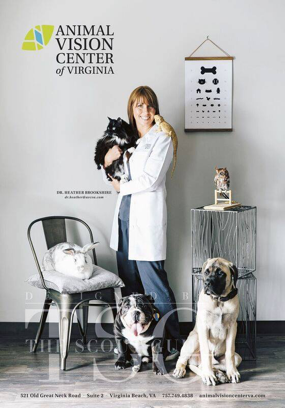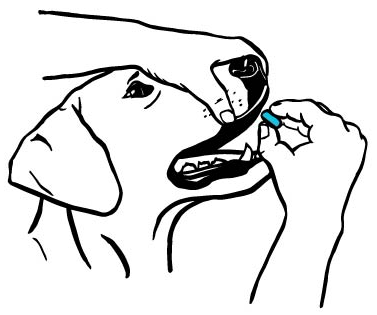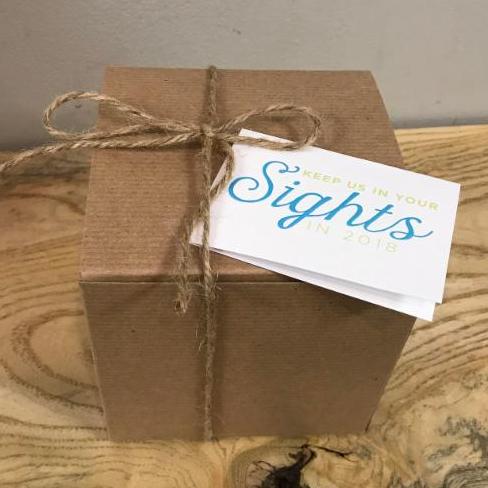|
WINTER EDITION: January 2018
|
 |
From the Desk of Dr. Heather

Our days are so busy here at the Animal Vision Center of Virginia. Between wellness eye exams, surgeries, off-site visits and the many tasks associated with running an ocular care facility, there's hardly a minute to oneself. That changed for an hour or so last fall, when I had the opportunity to work with the talented photo team of The Scout Guide. These beautifully illustrated booklets are published in 60+ cool cities throughout the U.S., showcasing premier local businesses through photograph and thoughtful design. For our placement, which appears now in the Virginia Beach-Norfolk issue, we wanted to illustrate our dedication to "providing quality ophthalmic care for animals of all shapes and sizes." It took a bit of animal wrangling to stage the image seen here. None of the animals were photo shopped, including Errol the Eastern screech owl! The experience was a great time, and I'm thankful to our staff and client pet owners for their role in critter control. This was a fun way to close 2017. Looking forward to new pet adventures in the year ahead!
Best wishes for the New Year,
Dr. Heather
|
 |
 |
Keep an Eye Out for Cataracts
Do your pet's eyes appear cloudy? Is she misjudging distances or bumping into objects? These are common signs of cataracts, and it may be time to have your loved one's eyes checked. A cataract is an opacity that appears within the lens of the eye, causing it to lose transparency and resulting in impaired vision. Most cataracts in dogs form due to genetics, but it can also result from systemic disease (diabetes mellitus); inflammation within the eye (uveitis); trauma; advanced age; or toxic or nutritional causes. It can progress slowly or rapidly, depending on the underlying cause, age and breed of your dog. The only true form of cataract treatment is to remove the cataract with surgery, and we have successful treated many cases here at our practice.
If you suspect your dog has cataracts, the first step is to schedule a wellness eye exam to have the eyes evaluated. If she is a suitable candidate for surgery, a functional testing of the retina will follow, along with an ocular ultrasound to determine if surgery will restore her vision. The success rate for cataract surgery in dogs is quite high, with greater than 90 percent of cases undergoing a successful procedure and having improved vision following surgery.
Beginning this month, we're offering a special 30 percent discount on wellness eye exams if you book your appointment by Jan. 31. Just call us at (757) 749-4838 for details and be sure to mention "Wellness Eye Exam." Here's to good health in 2018 - for you and your pets!
|
 |
Medication Tips and Tricks - Giving Your Pet a Pill

If only giving medications to your pet was as easy as waving a magic wand. Animals have an intuitive sense of reading our emotions. If we're nervous about having to give them a pill or eye drops, they will become anxious too. Over the years we've mastered the art of administering medications, and we're happy to share some of our tricks and tips with you in the next few issues of
Insights. This time around, we'll show you
how to give your pet a pill, step by step. Really, it's easier than you may think!
- For small pills, try hiding the pill in a small treat for your pet, such as cream cheese, peanut butter, liverwurst, chicken baby food or a "pill pocket." If this doesn't work, try crushing the pill and mixing it in with these treats or your pet's wet food.
- If hiding the pill doesn't work, you may need to manually pill your pet. For a small dog or cat, first wrap them snugly in a towel (like a burrito) to increase their security, prevent scratching and give you better control. For larger pets, place them in a sitting position on a nonslip surface in the corner of a room for security.
- Using your non-dominant hand, grasp the head from above and under the jaw and lift the nose toward the ceiling.
- Using your dominant hand, grasp the pill between your thumb and index finger and use the middle finger to pull downward and open the lower jaw.
- Drop or place the pill on the back of the throat (be careful not to get bitten).
- Finally, massage the throat, or follow with a small amount of water in a syringe to ensure that the pill is swallowed.
|
 |
Veterinarians Night Out at Hinterland Trading Company
It was a little too busy over the holidays to organize our Veterinarians Night Out, so we have moved the date! Join us on Wednesday, Feb. 7, from 6:00 - 8:00 p.m. for a creative evening at
Hinterland Trading Company
at Town Center in Virginia Beach. This will be just in time to design a handmade air plant arrangement for your Valentine, or to keep as a treasure for yourself! Look for invites to follow in your email inboxes soon!
|
|
|
 Next Lunch & Learn: Surgical Advances in Glaucoma Management, Jan. 26 Next Lunch & Learn: Surgical Advances in Glaucoma Management, Jan. 26
The topic of "Surgical Advances in Glaucoma Management" will be the subject of our next
Lunch & Learn
program, Friday Jan. 26 from 12:00 - 2:00 p.m. here in our office. We will be providing our local veterinarians the information they need to be able to best direct therapy for pets diagnosed with glaucoma. We will review medical therapy for glaucoma, but will focus this session on the newest advances in surgical lasers used to treat glaucoma, along with patient selection. These accredited continuing education sessions are open and free of charge to our local veterinarians. Please RSVP by Jan. 19 to
Dr.Heather@AVCVA.com
.
|

We are so grateful for the support that we have received from our local veterinarians in 2017, and we hope that you are already getting good use out of your new smart phone macro lenses. In case you have not used yours yet, it's super easy to use! Simply screw the macro lens on to the attached clip and attach it to your smart phone camera to take a high-quality close-up image. The images can then be used for your own in-house monitoring of progress on ophthalmic cases (especially from vet-to-vet) or sent to us for an ocular consultation. We are always happy to provide medical advice prior to referral or to simply answer a quick question. Feel free to call or text me at any time using the contact information provided with your lens.
|
 |
"I was referred to these folks by the Virginia Beach SPCA. My dog had a small tumor on her eyelid. She scares pretty easily and can be jumpy, but Dr. Brookshire and her staff were very good with her and she didn't stress out at all. I was very satisfied with their professionalism and the caring way they treated my little girl. The office is warm and welcoming and you feel comfortable the minute you walk in. I was also happy to find that they give veteran discounts. Every little bit helps these days."
-
Patti P.
|
ANIMAL VISION
CENTER
of VIRGINIA
521 Old Great Neck
Road, Suite 2
Virginia Beach, VA
757-749-4838
_____________________
HOURS OF
OPERATION
Monday, Wednesday, Friday
9:00am - 5:00pm
Tuesday, Thursday
10:00am - 6:30pm
One Saturday a Month
10:00am - 2:00pm
|
|
 |
|